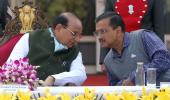The lieutenant governor is bound by the aid and advice of the council of ministers of National Capital Territory of Delhi in matters within the legislative scope of the national capital, the Supreme Court ruled on Thursday.

A five-judge constitution bench headed by Chief Justice DY Chandrachud said the term “administration” with regard to powers of the lieutenant governor cannot be understood as the entire administration of Delhi.
Delineating the boundary of powers of the LG, the bench, which also comprised Justices MR Shah, Krishna Murari, Hima Kohli and PS Narasimha, said he may act in his discretion only in two classes of matters.
“Firstly, where the matter deals with issues which are beyond the powers of the legislative assembly and where the President has delegated the powers and functions to the Lieutenant Governor in relation to such matter; and secondly, matters which by law require him to act in his discretion or where he is exercising judicial or quasi-judicial functions," the bench said.
The top court said executive administration by the lieutenant governor, in his discretion, can only extend to matters which fall outside the purview of the powers conferred on the Legislative Assembly.
"The term “administration” cannot be understood as the entire administration of GNCTD. Otherwise, the purpose of giving powers to a constitutionally recognised and democratically elected government would be diluted," the bench said.
"We reiterate that in light of Article 239AA (which deals with the special status of Delhi as UT) and the 2018 Constitution Bench judgment, the Lieutenant Governor is bound by the aid and advice of the Council of Ministers of NCTD in relation to matters within the legislative scope of NCTD.
"As we have held that NCTD has legislative power over 'services' (excluding ‘public order', ‘police', and ‘land') under Entry 41 in List II, the Lieutenant Governor shall be bound by the decisions of GNCTD on services.
"To clarify, any reference to 'Lieutenant Governor' over services (excluding services related to ‘public order', ‘police' and ‘land') in relevant Rules shall mean Lieutenant Governor acting on behalf of GNCTD," the bench said.
In a big victory for the AAP government in its tussle with the Centre, the apex court in a unanimous verdict ruled that the Delhi government has legislative and executive powers over services except for public order, police and land.









